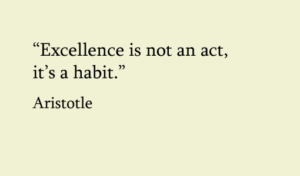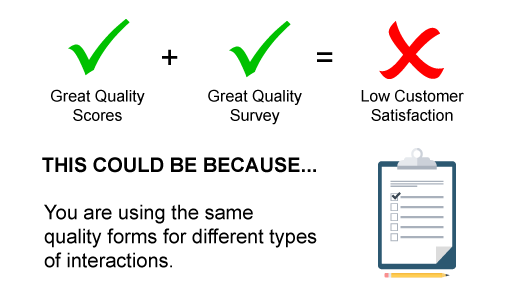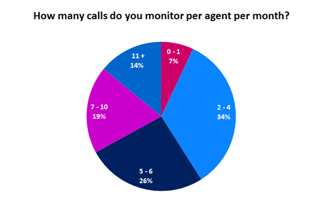Call quality monitoring involves evaluating and analysing the interactions between customer service representatives and customers to ensure that communication meets company standards and customer expectations.
It’s crucial because it helps businesses maintain high service levels, identify areas for improvement, and enhance overall customer satisfaction.
The article provides practical tips from our experts and readers to help you refine your call quality monitoring processes, offering strategies for effectively assessing call performance, leveraging feedback for training, and implementing best practices to improve both the customer experience and agent efficiency.
How to Improve Your Call Quality Monitoring
1. Define What Constitutes a Quality Customer Interaction and What You are Measuring
The aim of quality monitoring from an operational point of view is to identify the calls failing to meet predefined standards and get to the root cause of why. You can then make informed decisions to make the process better, faster and quicker.
For example, implement or refine agent training and coaching initiatives to bridge skills gaps, correct broken internal processes, improve workforce scheduling, or perhaps alert other areas of the organisation that are having an impact.
To achieve this, you need to be able to evaluate a representative sample of interactions. The smaller the sample, the less accurate your benchmark scoring will be, and you will run the risk of making the wrong decisions.
2. Hold Coffee Morning Reviews
Here is an idea which has been used in my centre. We have a programme which we call a ‘coffee morning review’.

Craig Pumfrey
It’s a weekly programme, attended by an operation manager, a quality assurance officer, a team leader, a supervisor and five agents.
We do ‘hearing tapping’/ listening to a recording (any subject: information, inquiry, or complaint) and then we discuss the agent’s recording based on the procedure. It works almost 100% of the time.
An agent who was invited to the programme wouldn’t be invited again the next week because he/she has been progressing well in giving great service (quality and service attitude).
Thanks to Craig Pumfrey
3. Put Emphasis on The Outliers
Because call monitoring is usually an expensive and manual process, it is not usually productive to monitor each individual equally, so you should shift your focus towards the outliers.
Ed Creasey, the Director Consulting at NICE, adds that when we talk about outliers, we are talking about the lower performers AND the top performers.

Ed Creasey
We need to monitor the top performers as well, because that is where you get the best insight about the best practices and the new behaviours that can really drive the results.
On the flipside of this, Ed insists that you also have to focus on the bottom performers, as that’s how you move the overall average to get the results that you need.
4. Focus on High-Yield Behaviours
Martin Hill Wilson, Director at BrainFood Consulting, underlines a key principle of quality call monitoring as the more that we understand about the detail of the behaviour, the more we are able to help people change their own behaviour.
So, if we increase our understanding of the high-yield behaviours, the greater benefits we will return from the change in agent behaviour.
Here is a list of high-yield behaviours that you can look to reinforce:
- Script compliance/adherence
- Reversing customer attrition
- Solving new-hire attrition
- High NPS technique
- Same result in 50% less Average Handling Time (AHT)
- Sales conversation technique
So, for example, the better we understand successful sales conversations techniques, the more effective we can be in advising agents how to improve their selling skills.
This can be hugely beneficial, in terms of sales in this case, more so than if you focused on lower-yield behaviours, such as First Contact Resolution Technique.
Find great tips and techniques for contact centre selling, by visiting our page on: Top Tips for Selling Over the Phone
5. Create a “Theme of the Month” Strategy
One interesting tip that was sent in by Kiryn, one of our readers, was to select a theme of the month for each agent based on their call recordings.
Kiryn reveals that it could be a soft skill (pitch, tone, empathy) or it might be technical (information provided, system use). I’ve had some good results getting my guys to focus on one point per month.
Usually, they can develop better habits in the course of the month, then we check back on that the next month and either keep working on it or choose a new topic.
I try not to overwhelm people and I think a theme of the month is a good way to gain focus.
6. Involve Agents in Coming up With a Quality Monitoring Checklist
Another one of our readers, Andrew, advises that you “engage your team in coming up with the quality monitoring. This means that they understand it, buy into it and provide it.”
This could be particularly useful if you mutually create a checklist of things that need to be improved. Doing this will allow agents to share their ideas of what they want and feel the need to improve, so you can be mindful of those areas when you next monitor their calls.
Martin also believes this is a good method for improving your call quality monitoring process, adding that, “The more that you can empower through involvement and co-creation, the more powerful it will be in terms of credibility and willingness to change.”
7. Let Agents Draw Their Own Conclusions From The Monitored Calls
When coaching agents by going through monitored calls, Rebecca, a regular visitor to our site, recommends a system where you never tell the agent how to improve directly, as they do in her contact centre.
This works by allowing agents to listen, reflect and ask questions for them to draw out the ideas as development for themselves.
Larry Skowronek at NICE believes that this is a good idea. He states that when the agent and the coach go into their meeting, because you’re dealing with all their interactions, the agent doesn’t have the ability to say ‘you happen to have found the one case where I did that, but it only happened once’.
So it removes the ability to blame sample size and allows the coach and the agent to become much more collaborative” and makes it easier to identify areas for improvement.
8. Include an Agent When Monitoring Another Team

Martin Hill-Wilson
Another idea that involves agents when quality monitoring would be to include an agent in the process of monitoring another team of agents, a plan devised by Anne, a visitor to our site.
Martin Hill-Wilson agrees with this concept, remarking: “I’m absolutely supportive of trying to get people more deeply involved in it.
So rather than being spoken at, people feel a much greater sense of ownership, and that’s a good technique to help facilitate a positive mindset.”
To watch the recorded webinar from which these tips (3-8) were taken, follow the link: Recorded Webinar: Best Practices in Call Quality Monitoring
9. Create Habits and Not Acts
For many of us, quality forms have become a façade of delivering great service, but it’s not actually habit building, according to Justin Robbins, a Customer Service Expert.

Great quality programs are about creating long-term sustainable improvements.
It’s about building habits that are going to become second nature to the team and allow them to deliver the best possible customer experience, which meets all of your needs as an organisation.
I believe, fundamentally, that quality should be about two things: foundation, whether or not we are doing something, and finesse, how well we do it.
10. Use Different Quality Forms for Different Call Types
Different types of agents will handle different types of calls. So, where these calls are inbound, sales or outbound customer service, each call type should have a different quality form.
To make this point Justin Robbins shares the following the story:
I received a call from a friend who said that we just put in a new Customer Satisfaction (CSat) program and we put in a new quality program and I think both are great. But, here’s the challenge, he said to me that on my CSat scores customers are rating us very poorly, but quality scores couldn’t be better.

Justin Robbins
So, I said well let’s take a look, maybe it’s a bad survey. I looked at the survey and it was one of the best surveys that I’ve ever seen.
Then, I said maybe your quality program’s wrong, so I took a look at it and it was one of the best quality forms I’ve ever seen.
I said wait a minute you handle a bunch of different types of interactions with your organisation, are you using this form for all of them? And, he said that he was.
So, we looked into the quality trends and it was really noticeable that there was a disconnect. Then, he said that this disconnect was due to the CSAT scores of the group of agents that were responsible for calling people and telling them that they were denied for mortgages or that they couldn’t get the money to buy the house of their dreams.
I said to him no wonder customer satisfaction is low they aren’t happy because they’re not getting what they wanted. But from a quality standpoint, there’s not much else that agents can do.

11. We’re Not Out to Catch You Out
Winning employee engagement and involvement from early on in the monitoring process is essential.
When monitoring is first introduced, there’s a tendency for some people to think it will be critical. On the other hand, where a monitoring system has been in place unchanged for a long time, agents may start to take it for granted.
Call centre quality monitoring is not – or should not be – a negative, top-down activity, designed to trip agents up. In the best contact centres, it is an integral part of the skills programme, of benefit to agents as well as consumers.
Monitoring that is collaborative rather than prescriptive, inclusive rather than authoritarian, is likely to lead to more acceptance and cooperation. Most agents find it helpful to know what the company expects of them and why their calls are important to the business and its customers.
12. Feedback, Support and Training are Fundamental
Feedback from the monitoring process should be objective, using a method of scoring and evaluating that is fair and agreed by all in advance, and it must be consistent and regular. Once milestones are agreed and set, they must be kept to, built on and progressed.
Feedback can be delivered one-to-one, remotely, or via group sessions where agents share and spread best practice.
Whatever method is selected, the important thing is that there is an opportunity for individual agents to contribute to the discussion.
Not only does this encourage their buy-in to the process, their comments and suggestions are often extremely insightful. But bear in mind that agents are sometimes harder on their own and colleagues’ performances than supervisors would be.
Staff support should be provided through interventions such as refresher and formal skills training and development and action plans to improve agent performance, always with the aim of improving the customer experience and achieving your business objectives.
13. External Benchmarking
As well as internal monitoring, it’s also helpful to compare your performance with others, especially the competition. Internal checks will give you a more subjective picture, which could be misleading.

In a poll, from a Call Centre Helper webinar, we found that most contact centres measures six or less calls, per agent, every month.
For a truly objective result, you need external benchmarking. Contact centres with no monitoring systems or resources in place should consider outsourcing these functions to an external agency. It can be a cost-effective option.
You can also find useful information on quality monitoring, and a number of contact-centre-related topics, by attending conferences and online webinars. From attending one of our webinars you can benchmark yourselves against similar practices by contributing to polls like the one above.
14. Stay Positive and Reward Best Practice
Steve, one of our readers, asserts that “If the monitoring is done in conjunction with coaching and development of your reps, it is essential that you make the experience upbeat and positive.
“When reps go into monitoring sessions thinking there is a disciplinary action coming at the end of it, it makes for a defensive-minded rep.

James Le Roth
“Before going into areas the rep can improve on, look for their positives and make a big deal out of them. The rep will then be more open-minded to the constructive criticism that follows. These sessions should be short, fun and positive.”
In order to maintain this positivity, you can reward high-quality work through mechanisms such as ‘advisor of the month’ awards and staff excellence certificates, or highlight it in your company newsletter and intranet site.
And if consumers are pleased with the service, pass on their messages. Integrate all these positive points into the company’s annual appraisal and benefits schemes.
Thanks to James Le Roth
For more about improving agent morale, read our article: Use Your Imagination! 11 Creative Tips That Will Boost Morale in the Contact Centre
15. Save Your ‘Golden’ Calls
Identify and save examples of your best practices or ‘Golden’ calls so that they can be used as a training aid to help continually improve the overall call-handling process.
By doing this, you can pick out successful techniques that call centre agents are using and make notes of words, language and signals that received a positive response from the caller.
Thanks to Jonathan Evans, Senior Business Systems Manager at TNT Express
We have our own list of Top 25 Positive Words, Phrases and Empathy Statements to use in the contact centre, which has been created to increase customer–agent rapport.
16. Apply a Well-Thought-Out Quality Assurance Procedure
I am amazed at the number of companies who purchase call recording solutions in order to remain “compliant” with security or FSA regulations that do not have a structured call quality monitoring policy in place.
It’s always one of those “we’ll get to it sometime” things that might not show itself as important, or possibly there are other larger fires to fight in your business. Others may baulk at the inordinate amount of time or effort to manage the process as well.
If you want to see an uplift in the overall customer experience, a well-thought-out quality management procedure can work wonders. It gives your agents something to strive for.
Also, it gives you insight into the core traits and skills that your agents need to interact with your customers, and the customers themselves will also have a more positive experience when doing business with you, giving your business that competitive advantage.
Find out more by visiting our page on Call Center Quality Assurance and Click here for our 59 Call Centre Quality Assurance Tips
Thanks to Gene Reynolds, Director at Blackchair
17. Create a Call Quality Forum
An additional step of setting up a forum to reach a consensus on what good looks like will pay dividends.
Ensuring that all stakeholders are agreed on what constitutes ‘good’ and capturing the criteria in your monitoring forms will support your call and quality monitoring staff in achieving the objectivity that is so essential.
It is critical that measurement criteria are clearly defined and agreed and there is consensus on what ‘good’ looks like.
18. Set up Call Levelling Sessions
The best way to do this is to set up call levelling sessions that are held on an ongoing basis. Take a random selection of calls. Get all stakeholders and, where possible, call monitoring staff, or managers if this is not feasible, and listen to the calls together. Score them as you go along.
After each call, discuss the scores for the criteria monitored and, where there is a wide variation, the reasons. If all scores are within a narrow range you’re in luck, but more often than not, there will be a wide variation between the scores for many elements of the call, especially when you first start this process.
Through the session the range of scores should narrow as the various stakeholders adjust their scoring and reach consensus. Over time, opinion and individuals involved will change so it is important to have regular call levelling sessions in order to maintain the consensus.
19. Get Your Scripts Right
Ensure the wording in your scripts, or what your agents are expected to say to be compliant, is identified in your call monitoring forms and that your scoring reflects the common understanding of what would be classed as compliant or a breach.
To discover ideas to boost your contact centre script, read our article: Trade Secrets: Simple Ways to Improve Call Scripting
20. Use an Independent Call Monitoring Facility
Objective call monitoring can be difficult to achieve and maintain when all monitoring activity is carried out internally using your own people.
There are companies who offer independent call monitoring services who can provide you with a truly objective view of the quality of your calls, whether they are compliant with the prevailing industry guidelines and regulations and in some cases benchmarking.
To keep control of costs, look for companies who are happy to give you a one-off report covering a batch of calls, perhaps the same batch of calls used for your call levelling sessions.
Thanks to Janette Coulthard
21. Have a Two-Phase Approach
One good strategy to quality monitoring would be to adopt a two-phase approach. Firstly, QA monitor without agents knowing, so as to assess the agent’s typical behaviour.
Secondly, the team leader monitors, having told the agent they will be listening. This will allow the agent to show their best behaviour and therefore encourage relevant development.
Thanks to Lindsay
22. Assign Quality Ownership
It sounds obvious, but if nobody wants to own the process, how can it be audited and calibrated to ensure it is effective and continues to improve and adapt to the business’s changing needs?
Similarly, there should be a clearly documented process for monitoring and evaluating calls, and all agents and team managers should be trained and familiar with all areas of quality monitoring and how to get the most from the system they have in place.
23. Develop and Maintain Evaluation Forms
Evaluation forms are at the heart of a good quality monitoring programme, and when compiling them you need to ask yourself:
- Am I asking the right questions?
- Am I getting the required results? i.e. output which leads to a continuous coaching and development plan for my team
- Does the scoring mechanism allow agents to provide an ‘outstanding’ or ‘Wow factor’ service not just an ‘average’ or ‘satisfactory’ service?
Follow the link to download our own free example of a Free Call Monitoring Form
24. Evaluation Dispute Process
Agents need to be given the opportunity to dispute their evaluation if they are not happy with any aspect of it.
The dispute process allows the agent the opportunity to have their evaluation re-evaluated by another person if they are unhappy with the result. This way, agents feel they have more control over their call evaluation, thus further empowering them to take ownership of their own quality.
25. Agent Synergy Session
Synergy sessions involve groups of agents, team managers, CSMs and trainers listening to calls together to discuss call-handling techniques and evaluate the quality of the call.

Brent Bischoff
These sessions help reinforce quality standards and allow new and experienced agents to share experiences and best practice, and they provide a natural way to cross-skill agents from different departments.
Studies have shown that agents attending regular synergy sessions achieve anywhere from 5% to 20% higher quality scores than the overall contact centre.
Thanks to Brent Bischoff at Business Systems.
26. Focus on Behaviours
One way to ensure quality becomes about building habits that are fixed around achieving the right results for the company, is to set quality criteria that is based around behaviours.
Mark, one of our readers, suggests criteria such as passionate, friendly, professional, interested, helpful, engaged etc. (whichever behaviours are important to your business).
Encourage your agents to define the meanings of each behaviour and score the behaviours that you see and hear on a scale of one to five.
This scale could possibly look something like this: 1. Unacceptable, 2. Support Needed, 3. Delivering Standards, 4. Exceeding, 5. Outstanding.
While this idea could certainly aid the process of building customer friendly habits, the scale seems a little subjective, as one quality may see the call as “exceeding”, while another may deem it “outstanding”.
So, the contact centre could either shorten the measure to a scale of 1-3 or just poor/average/good, to minimise confusion, or run regular calibration sessions, for analysts – and maybe an agent to two – to attend, to synchronise scoring.
To enhance your scoring system, read our article: 10 Top Tips to Improve Your Quality Scores
27. Assess the Effectiveness of Your Training Programmes
Use call quality monitoring to assess the effectiveness of your training programmes, by listening in to verify that points taught in training sessions have been noted and put into practice.
Call quality monitoring is also an easy means of assessing where gaps in knowledge or practice may exist – use this learning to build training solutions which close those gaps off.
Thanks to Cameron Ross
To make sure your induction training is effective, follow our Top Tips for Induction Training Programmes
28. Include Five Role-Play Calls For Different Situations in Training

A good exercise for trainees would be to sign off with the QA team before they go live on the phone, by participating in five role-play calls for different situations.
These calls are then monitored by two QA members and, providing the average score is over 90%, then we sign them off or advise if more training is needed before going live on the phones.
Thanks to Mia
For even more training advice, read our piece detailing 50 Call Centre Training Tips
29. Simple Personality Tests
I’ll often ask a new team to conduct a simple personality test. This educates them to their own and others’ personality types, so they can better understand their own behaviours and how their actions can affect others, and vice versa.
This makes them more receptive to feedback on their performance, as they appreciate why they have acted in such a way or a customer has reacted in a certain way.
Thanks to Teresa
When we visited the British Gas contact centre in Cardiff, we found out that they run similar personality tests. Find out more by reading about the site visit: Hints and Tips From an Award-Winning Call Centre
30. Spend Five Minutes Reviewing Yesterday’s Calls
We use 5 minutes at the beginning of an agent’s shift to review calls from the previous day. We try to do this for 5–7 agents per day.
This way, the feedback is fresh in their memory and helps shape their day ahead.
We started this a few months ago and it has been well received by both our management team and agents.
Thanks to Rob
For more of our insights on quality monitoring and quality assurance, read our articles:
- Call Centre Quality Assurance: How to Create an Excellent QA Programme
- 19 Golden Rules for Call Monitoring
- Call Centre Quality Parameters: Creating the Ideal Scorecard and Metric
Author: Megan Jones
Reviewed by: Hannah Swankie
Published On: 1st Feb 2017 - Last modified: 12th Nov 2024
Read more about - Hints and Tips, Brent Bischoff, Business Systems, Call Handling, Call Quality, Call Recording, Coaching, Craig Pumfrey, Ed Creasey, Janette Coulthard, Justin Robbins, Martin Hill-Wilson, NICE, Quality


















Thank you for sharing these are excellent tips! I also recommending using analytics to focus your call quality monitoring efforts – you’ll experience exponential value. You can not possibly listen to every call and only a very small percentage of calls are actually coachable and worth listening to. Are all your calls of equal value? Instead of recording a small percentage of calls and randomly listening to a few of them each month, I recommend focusing on the areas that you want to improve most by capturing all of your multi-channel customers interactions and using data and desktop screen analytics to pull information from employee desktop applications to associate valuable business information to each call. They are tracking information like: “Was the call put on hold?,” “Was the transferred?,” “What level of employee was it handled by?,” “Was it a VIP customer?,” “Was there a sale or no sale and, if so, what was the value of the sale?,” etc. Using this data, newer call quality monitoring systems can automatically deliver a sample of the high-value calls to managers and QA analysts for evaluation. By monitoring and evaluating these high-value calls, you’ll be able to rapidly identify issues and opportunities for improvement and make accurate business decisions about what to address and solve the issues.
Wonderful …I have been working as a call center agent in Aegis BPO Ltd,lko & preparing for Quality Analyst..this link & information shared helps a lot to me to understand what Qaulity is all about ….Thanx
Sheeba ,lucknow (india )
Hi All,
Firstly, some fantastic tips here, really useful.
I work as the Quality and Training Manager at my contact centre and I wondered if anybody had any advice on how I get my advisors to stop using negtive words?! Any fun games we could play with the underlying message to take these words of their calls. Things like basically, maybe, probably etc etc.
Any advice would be great.
Thanks
Wendy
Does anyone have examples of quality monitoring forms you use either for phone calls or electronic cases?
Bruce
Here is an excel quality monitoring form.
https://www.callcentrehelper.com/free-call-monitoring-form-3507.htm
Hi there
does anyone have a statistic of what “good” call monitoring looks like i.e. a % of calls that should be monitored ? My firm does 0.3% of incoming calls and this just doesnt feel right !
Hello!
I work as a Quality Assurance-Trainer on the help desk. I am having difficulties with analysts following scripts. They are failing to verify contact information, address users by name, and offer further assistance. Also, their motivation and enthusiasm lacks.
What’s the best approach or coaching method to use? Any suggestions would be much appreciated.
This is a very informative website, where I work we use an electronic version of call monitoring where ever call is automaticly recorded. My company makes B2B calls setting up appointments for our field sales force to attend. for monitoring purposes we select at random one call from each week to mark, we have a strict criteria of questions and information they are expected to obtain which would constitute a good call. The agents are expected to obtain 80% + they are financially rewarded for good quality and the lose bonus for poor quality. They soon ensure they are ticking all the boxes. We also have call leveling sessions and side by side coaching, but I find the side by side coaching it is not a true reflection of their capability as they are either wary of having their manager sat beside them and perform better or worst than they would in a normal day to day situation. I feel Call monitoring has improved the quality of our business and it is transparent if we have allegations from the field as we can verify the conversation as on occasions the customer has changed their mind by the time of the reps visit and disputes they even made an appointment. from this point it is also invaluable and the agents appreciate the benefits.
I found all the tips to be very useful. I am trying to create a coaching program for call monitoring deficiencies, does anyone have any ideas or programs that they currently have in place, thank you.
Excellent,its very useful…
Great thank you for the information, I am looking to review a quality system in place for a B2B call centre with 1000 agents. Does anyone have any good quality processes/measures that I can look at? currently we have a quality team who evaluate 0.50% of calls – I am keen to increase the support we offer without increasing the quality FTE’s.
Any advice would be appreciated. Also I am echoing Ian’s comments above what is a good % of calls to monitor?
Thanks,
Jamie
Good Evening. . .
Thank you for all of your excellent suggestions!
Does anyone have a suggestion on how to evaluate the “Whole” call? I would like to find a balance between the necessary structure/ quantitative benchmarks and a measure of evaluating if the client was completely satisfied at the end of their call. I find often we are policing the agent and the QA metrics have become so picky that we lose track of the bigger picture. Was all of the clients needs met or exceeded? Was the client satisfied?
I would like to utilize many of our current QA metrics,while still empowering the agents to have a personally, have a little leeway, build/nurture client relationship, resulting in the client being satisfied. Thank you!
Hi, i am an QA in quality department of a call center. This article is very usefull for me.
I am a contact center operator, i ask is fair for my call to be re evaluated after disputing the score only to be found I was right the first time but hen opps! found something else to fail you on, it would seem when i talk to the client I have one chance why does the evaluator get to change the score after first or fith time it may have been disputed? How can this be fair
thank yOu so much for the input, i am a Quality Coach EveluatOr in a call center and this information is going to help a lot. Thank you again.
”Allow self awareness” . This is one aspect that is over looked in most call centers. Thats why most agents do not take full accountability for adherence to quality std. They feel that their input is not valued.
Can anyone give me any tips on how to remain calm and n
not get stressed during side by side monitoring
hi this artical really helpfull for me. i need some tips on enhancement of call calibration that means after the call calibration.
These are helpful tips. In our contact center, we evaluate(listen to the whole call) calls everyday to ensure if agents meet the quality standards and to know if customers are satisfied with the service provided. SOPs are critical part of our evaluation and we give high-value on this area. We always make sure that the issues identified and areas of opportunities are discussed to the agent or to the team so that it will be addressed and be resolved.
Hey there i am call centre quality assurer and trainer curently! can someone please give me companies names/website that can help me in learning more about the field? thank you very much for advise given above it so useful!
The tips were really usefull and good mostly in call monitoring parts and quality control of calls.
Good Tips team. Thank you so much for sharing the same…
Hello! I monitor calls everyday and found the tips useful. Data collection is an important part of quality monitoring and I thinks its gonna be great if someone can post a excel monitoring sheet with automated formulaes
thanks alot for your effort and this great information, i am a quality supervisor am looking how can i make the agents feel that quality an coaching is healthy it isnot a police department, also i need a form to fill it in order to count the coaching sessions beyound the KPIs in order to inform the employees that there is no coaching for ever and there is a displinary actions should be taken.
call monitoring helps quality production of the company………… thats what i believe
Hi Everyone- These tips are very true and effective.
Monitoring & feedback is the most important part and process while evaluating calls,
Someone wanted to know how to evaluate complete call: So in order to evaluate complete call
1st we should have QA Form which should includes different fields related to call parts,ex: Opening to the end or call closing.
Agents should start the call with appropriate greeting and should answer the call ASAP.
Then it comes to the call body: where communication effectiveness, customer service or selling skills comes in like : sounding energetic, grammatical, communication skills, probing for sales etc,
Disclosing of the information should be correct as well.
In the end comes: Call closing where should end up the call by following set protocols.
Like offering further assistance or standard ending script.
Feedback: After monitoring a specific call, if an agent is lacking on different things or doing mistakes. There should be a proper procedure of delivering Feedback.
1st we should appreciate the agent in a friendly way that he or she is doing great job on the calls, and share good things in there calls, and then tell them that these things you are missing and if add them in your pitch it can be more better, do not just tell them things they are missing also share with them how they can improve them, on top of it make them listen some Golden Calls so they can have better understanding.
After feedback have them set future action plan and make sure they follow that by reminding them everyday Via e mails or by just going to them about there action plan.
Results and improvement will be there,if not fast but slowly slowly you will be able to see the difference.
I’ve been in an quality analyst role for 3 years, I am now being asked to take calls 6 hours per week to “legitimize” my position. Is this common practice? I have also been a customer service representative for that same department.
Thanks for the input. Above all effective monitoring and accurate feedback must be followed up with a great action plan. Involving agents would normally be done and as an analyst aside from checking the quality of calls acting as a safety blanket or doing preventive action will also help make quality calls consistently.
Melmaj,
Well first let ma ask if you do analyst job for the same company for 3 years? if yes then you are a bonafide QA however if you are in a new organization this is a practice that is commonly done to new hire externals. Think of it as a
commencement exercise anyway to be effective as QA is to be in depth with product knowledge.
How many people are needed to control the call quality?
We are introducing a monitoring officer to our organisation and I wonder if anyone has a current Job Description I could have a look at
Great tips thank you. I have a question, it is necessary to randomize the sample at the associate level? meaning, try to eliminate the quality associate chance to “choose” the call?
Going for interview for monitoring analyst tomorrow. BRILLIANT SITE AND TIPS.
i have been working as a Quality assurance in a tracking company,i have facing some issue related my contact center agent is did not like me, bcz they are agent and i m in QA, actually i was agent 1 year ago, recently my seniors appoint me in QA department, so they feel professional jealousy, dnt know why, i tried to maintain a good relation with them, but they dont want accept me as a Quality supervisor, please let me know what should i do, i will be very thank full to you,,
My work is base on agents performance, always looking for a continuis improvement. one really usefull tip is classify your agentes on levels. for example a great agent could be an A agent, a good agent B agent, regular agent C agent, bad agent D agent. This can help you give a direction to your trainings, dont waste time tring to become a “D” on an “a”. Help the A to keep his numbers and the “B” to become “A”
I have been working as a QA. There is constant friction between Quality and operations which stems from the fact that Operation is only for driving numbers where as the entire process improvement and process stability depends on efficiency of quality. Is it always like this across all centers? Am i wrong in guessing that role of Quality is to audit calls and provide appropriate feedback to operations so that they come up with plans (of-course with support from quality and training) for overall process improvement.
Hi Satish,
It’s true that sometimes Operations are focused on productivity metrics. I agree that the role of quality is to audit calls and provide feedback. I think it is a good idea to find out whether improved productivity (more calls taken) has resulted in the same quality standard or whether more calls result in decreased quality. Presenting the results that identify why you are giving recommendations is a great way to reduce friction.
I’m working now as a QualityAnalyst in an international company and any suggestions of how can i put rules for all the agentsto get the customer obssessed rate
’m working now as a QualityAnalyst in an international company and any suggestions of how can i put rules for all the agentsto get the customer obssessed rate
Some of these monitoring ideas for quality ect have the opposite effect on morale,for the call centre agent is all geared to tripping the agent up and getting him sacked in the call centre I work in,never known Team Leaders to be so nuts about stats and quality
I am working with a service provider company as a quality analyst. All these tips are really helpful
I’m in traning as QA. These tips are very useful to me
I have done Quality Assurance for over 5 years now, and have been in call centres for over 17 years. And so much to learn still:-))
Some aspects I am sure of though:
— Quality Assessment, and especially Coaching and Feedback must be balanced, more than anything else. Mention the improvements needed, as well as those aspects adhered to successfully.
— Integrity. Personal as well as professionally. I have Agent colleagues who beg for me to QA them, because they know I am fair. Strict, fair and objective.
— I do not cut corners at all. If there are any hitches along the way, I note this in the QA feedback.
— I make it clear to my Agent colleagues that I do not know everything. I am there to learn, much as they are.
— Even as I am writing this, I have colleagues from another department asking me excitedly when I am going to “QA” them.
I am humbled by my experiences, and buoyed by the experience I have gained, and absolutely excited about what there is still to learn!
Never go out to anyone. Your gains will be short-termed, trust me.
ERRATA : Never go out to gun for anyone. Your gains will be short-term, trust me.
I really learnt a-lot from all the training lessons given and appreciate the good work.Its been really helpful as a new call center supervisor
Thank you some much for this information and it will help me a lot.
Call Monitoring must be given wrong information and Incomplete Information,No need to look at detail about call listen because of there is big different between handle calls from Customer and ,relax and coaching to Agent.
The way we need to train agent more knowledge and reply to respective sector.
Hi I’m a quality assessor for a banks call centre.
We sitting on 50+ agents per QA and have to assess 15 calls in the month per agent.
I feel we are assessing too many calls and not really focusing on developing the agents. As we forever rushing month end to reach the target of the 15 calls as assessors.
What would be the most appropriate number of calls to assess per agent each month to still be able to give constructive feedback and trends?
Re: #26. When I worked for First Direct the training included role play sessions and plenty of feedback. When we had been inducted, part of the weekly schedule involved supervisors plugging into the call and sitting alongside you with monitoring sheets filled in and discussed afterwards. This was a far better system than hidden monitoring and implies trust in the agents’ professionalism. Of course, some random hidden monitoring would probably be sensible but not as a routine part of a development plan as that smacks of Big Brother spying. FD were excellent at customer service then and won awards to prove it. Sadly, that has all slipped since the CEO left and now FD operate as an HSBC clone trading on their previous good name.
Very nice article informative content thanks we liked it.
Impressive article.
Very nice article informative content thanks we liked it.